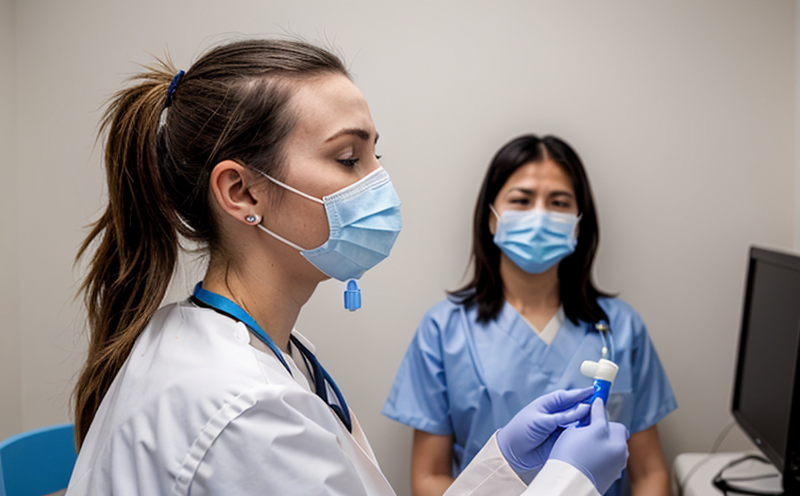Ornithobacterium rhinotracheale (ORT) Respiratory Testing in Birds
The Ornithobacterium rhinotracheale (ORT) respiratory disease is one of the most prevalent bacterial pathogens affecting avian species. This Gram-negative bacterium primarily targets the upper respiratory tract, causing symptoms such as tracheitis, rhinitis, and sinusitis. ORT infections are particularly common in poultry farms, pet birds, and aviaries, leading to significant economic losses due to reduced productivity, increased mortality rates, and decreased quality of life for affected birds.
Diagnosing ORT is crucial for managing outbreaks effectively. Early detection allows for timely implementation of control measures such as vaccination programs or antibiotic treatments, thereby minimizing the spread of infection within the flock or aviary. Accurate diagnosis also plays a vital role in preventing the introduction of ORT into clean environments by identifying and isolating infected birds.
Our laboratory utilizes advanced diagnostic techniques to identify ORT, ensuring precise results that are essential for effective management strategies. These methods include but are not limited to bacterial culture, PCR (Polymerase Chain Reaction), and serological tests like ELISA (Enzyme-Linked Immunosorbent Assay). Each method has its advantages depending on the specific requirements of the diagnostic process.
Bacterial cultures provide a definitive diagnosis by growing the bacteria in suitable media under controlled conditions. This approach is particularly valuable when identifying new or emerging strains of ORT, as it allows for phenotypic characterization and antimicrobial susceptibility testing (AST). However, culture-based methods can be time-consuming and may require several days to yield results.
PCR technology offers rapid detection with high sensitivity and specificity, making it ideal for screening large numbers of samples quickly. This method amplifies specific segments of the ORT genome using primers designed uniquely for this pathogen. Real-time PCR (RT-PCR) further enhances this technique by allowing quantitative measurements of target DNA or RNA, which helps in assessing the extent of infection.
Serological tests like ELISA are used to detect antibodies against ORT antigens in bird sera. These tests are non-invasive and can be performed relatively quickly compared to other methods. They are useful for monitoring herd immunity levels over time but cannot differentiate between recent infections or previous vaccinations based on serology alone.
The choice of diagnostic method depends on various factors including the urgency of results, resources available at your facility, and specific needs related to outbreak management. Our team of experts will work closely with you to determine which approach best suits your situation while ensuring accuracy and reliability in every test conducted.
Why It Matters
The prevalence of Ornithobacterium rhinotracheale (ORT) respiratory disease poses significant challenges for the poultry industry, pet bird owners, and zookeepers alike. Efficient management requires accurate diagnosis to implement appropriate control measures promptly. Early intervention can prevent further spread within flocks or aviaries, reducing mortality rates and improving overall health outcomes.
Accurate testing also supports biosecurity efforts by identifying infected birds early on so they can be isolated from healthy ones. This practice helps maintain disease-free zones where strict hygiene standards are maintained, thus protecting both commercial operations and private collections from unwanted pathogens like ORT.
From an economic perspective, preventing losses due to reduced productivity is crucial for maintaining profitability in any agricultural enterprise focused on avian species. By detecting ORT early through reliable testing methods, businesses can minimize downtime caused by illness outbreaks, ensuring continuous operation without compromising product quality or quantity.
In addition to financial benefits, timely diagnosis aids in preserving environmental sustainability practices by avoiding unnecessary antibiotic usage when no actual infection exists. Responsible stewardship of antimicrobial agents is vital for combating the growing global issue of antibiotic resistance, which affects both human and animal health sectors alike.
Benefits
By leveraging our state-of-the-art diagnostic services for Ornithobacterium rhinotracheale (ORT) respiratory disease in birds, you gain access to several key advantages:
- Precision Diagnosis: Our laboratory employs multiple advanced techniques including bacterial culture, PCR, and serological tests like ELISA to ensure accurate identification of ORT.
- Timely Results: Quick turnaround times mean faster responses to potential outbreaks, allowing for immediate action to be taken before the situation worsens.
- Evidence-Based Decision Making: Reliable test results provide clear insights into the prevalence and distribution of ORT within your flock or aviary, supporting informed decision-making processes related to management strategies.
- Biosecurity Enhancement: Early detection enables better isolation protocols that help maintain disease-free environments, reducing the risk of introducing new pathogens into clean areas.
- Economic Efficiency: Minimized losses due to reduced productivity translate directly into increased profitability for agricultural enterprises focused on avian species.
- Sustainable Practices: Responsible use of antibiotics contributes to preserving their effectiveness and reduces potential environmental impacts associated with excessive drug application.
Eurolab Advantages
At Eurolab, we pride ourselves on delivering exceptional service with unparalleled expertise in clinical & healthcare testing. Our commitment to quality ensures that you receive accurate and reliable results every time, backed by years of experience working across diverse sectors.
Experienced Staff: Our team consists of highly skilled professionals dedicated to providing top-notch support throughout the entire diagnostic process—from sample collection to final report generation.
Accurate Results: Utilizing cutting-edge technology and rigorous quality control measures, we consistently deliver precise results that can be trusted in making critical decisions about your avian population's health.
Comprehensive Support: From initial consultation through to post-test follow-up, our dedicated staff are here to assist you every step of the way. Whether you need guidance on sample preparation or advice on interpreting test results, we're just a call away.
State-of-the-Art Facilities: Equipped with modern equipment and facilities designed specifically for avian healthcare testing, our laboratory guarantees optimal conditions for obtaining high-quality samples.
Compliance & Standards: Adherence to international standards such as ISO 15189 ensures that all aspects of our operations meet the highest industry benchmarks. This commitment translates into greater confidence in the accuracy and reliability of your test results.





